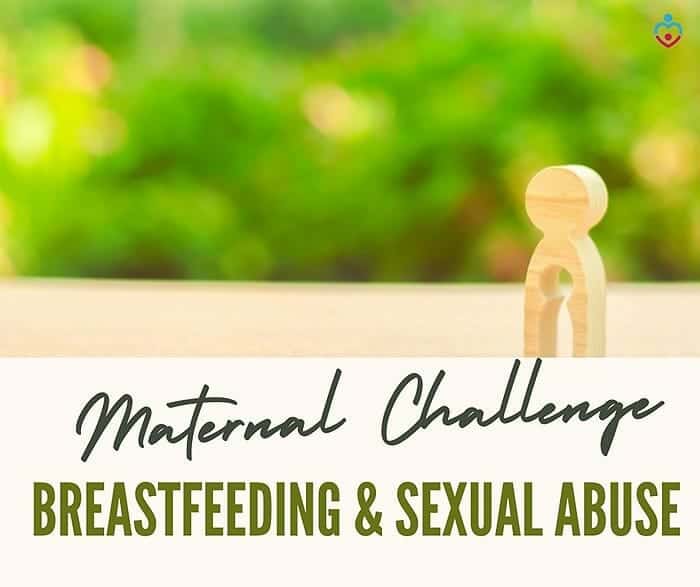
If you are a victim of sexual abuse, know that it is normal to notice such trauma impacts your nursing perception.
Jump to:
Breastfeeding and Sexual Abuse
- Different women react differently according to the type of sexual abuse they went through and how long it happened before having a baby. In the worst-case scenario, the baby could be a result of such a trauma.
- Either way, you can expect sexual abuse to be an experience that leaves marks in your life as a woman and mother.
- Sexual abuse can make mothers more determined to breastfeed their babies, or on the contrary, very resistant to this idea.
- There is a difference, however, between sexual abuse and sexual assault. Sexual abuse is the trauma that occurs within the family or circle of close friends. In contrast, sexual assault is the name of sexual trauma outside the familial circle of the victim.
- Both will have severe consequences not only for a woman as a mother but for any woman. Seeking help and taking the necessary steps towards healing are essential things you can do to move on and live a healthy and thriving life.
Suggested Reading:
![]()
Problems breastfeeding after sexual abuse
Mothers who have problems breastfeeding usually went through such a drama reasonably recently before having their baby.
- The fresher the memory of abuse is in the mother's mind, the more challenges it creates for them. If the baby was a result of sexual abuse, things could get even more difficult.
- Nursing implies intense contact between the mother and the baby at a physical level. This contact can be difficult to handle after sexual abuse as it is not interpreted and understood correctly. If that is the case, both the mother and the child suffer, so such a situation has to be addressed immediately.
- On the other hand, some women who are victims of sexual abuse might see the act of nursing as more painful than it actually is. This happens because the trauma lowered the tolerance levels when it comes to pain.
- Breastfeeding could also bring painful memories back in the victim's mind, making them reject the idea of nursing altogether. Luckily, this can be healed as long as it is addressed as soon as it is identified.
- Unfortunately, identifying the problem is half of the solution in this case, as most victims of sexual abuse tend to block the trauma in their minds which makes it more challenging to move past it healthily.
If you find yourself struggling with nursing your baby post-sexual trauma, know that you are not alone, nor are you to blame. Healing is critical in these situations. Talking to a therapist can really help you sort out your emotions and understand them.
![]()
Mothers that are more determined to breastfeed after sexual abuse
Some mothers become even more determined to nurse their babies, mainly because they went through sexual trauma.
- Even if this is a much better outcome than the previous one, therapy and professional help are still needed in this situation.
- Mothers who seem to not have a problem nursing their babies even if they went through sexual abuse might be able to do that because the trauma happened long in their past.
- Time can heal part of the wounds of such an experience, and it can make the bad memories of the trauma fade.
![]()
What to do if you are dealing with the consequences of sexual abuse?
If you went through such a trauma and you are now a mother, there are some things you can do to offer both you and your baby the chance to a healthy connection.
- Identify the trigger you are facing: For example, if you don't find it comfortable to nurse, you are not comfortable with skin-to-skin contact. If that is the case, you might be able to use a towel or a cloth to reduce the skin-to-skin contact and still nurse your baby.
- If you have flashbacks when you nurse your baby that stops you from enjoying or even completing this task, you can pump your milk and feed them with a bottle. However, this is not offering your child the contact with their mother that they need so much. Still, at least they will get the nutrition from your very important breastmilk.
- Holding your baby's hands as they nurse can also help prevent them from touching your body, but it can also add to the emotional bond between you two. Focus on your baby and try to keep your mind on the action you do primarily for them.
- Talk to a therapist: Opening up about a sexual abuse experience can be challenging. As a result, some victims decide never to talk about such a trauma. However, talking with a specialist can make a big difference in the healing process necessary for all victims of sexual abuse.
- Going through a sexual abuse experience can leave deep wounds in your life, but it doesn't mean that you can't healthily move past this trauma.
![]()
Your role as a mother and the well-being of your baby will depend on your effort to heal yourself from past trauma so you can offer them the best type of relationship.


